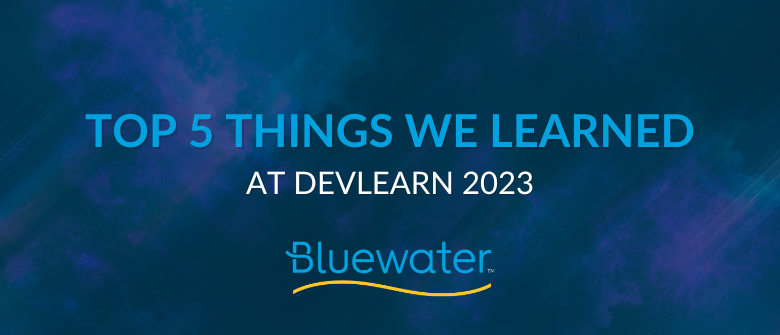At DevLearn 2023, it was evident that the landscape of training and development stands at a pivotal juncture. Contrary to expectations, there weren't any groundbreaking innovations, but a plethora of steadfast learning products held their ground. The sentiment shared by many was a need for a significant shift in Learning & Development (L&D)—either invent anew, adapt, or face unpalatable transformations. This is driven by a desire for L&D efforts to wield a measurable impact.
From a product perspective, the spotlight was primarily on content development tools and models, intriguingly, even from established Learning Management System (LMS) vendors.
Navigating Trends and Challenges
Numerous L&D teams expressed feeling swamped, either due to their current tech stack or the daunting prospects of acquiring new technologies. The pandemic saw a surge in tech acquisitions, leading many to introspect and seek consolidation in their tech arsenals. The crux of the conversations centered around harnessing more value from a leaner tech suite.
There's a palpable shift in the wind; the lure of flashy tech has waned. L&D professionals are scouting for genuine, specific solutions that address tangible issues. Many organizations are heeding the clarion call for reinventing their L&D strategies, especially in a post-pandemic world, seeking a more tangible impact aligned with business objectives. A refreshing take from this year's conference was the proactive quest for effective strategies rather than tech-driven solutions, auguring well for the future.
#1 - AI's Role in DevLearn 2023
While Artificial Intelligence (AI) unquestionably holds potential, the learning tech vendors are threading cautiously. Its primary application, currently, is in content development. Larger enterprises, equipped with ample resources and strategy, seem poised to integrate AI, leaving one to ponder if this might lead to a widening rift between large corporations and their smaller counterparts in the L&D sphere.
Noteworthy mentions in the AI domain include Docebo, Schoox, and Learning Pool, with promising focused AI features. The coming year promises insights into how AI will shape the learning trajectory. There is also anticipation about an increasing role of AI in content translations, given its adoption by several translation companies.
#2 - The LMS Conundrum
A prevalent sentiment, irrespective of product quality or vendor reputation, was dissatisfaction with LMS systems. The undercurrent was a shared belief in the value of LMS but a struggle to unlock its full potential. The generalist nature of many LMS and LXP tools has led to a clamor for industry-specific solutions. The shift appears to be towards using the LMS as a foundational tool within a broader ecosystem, adapting it to cater to distinct business needs without plunging into customization.
For those intrigued by these discussions, Bluewater's LMS apps offer a glimpse into this realm.
#3 - Learning Alignment – Bridging the Gap
A prominent trend is the alignment of learning to skills, underscoring the imperative for such skills to correlate with business needs. The alignment of business needs with training and learning initiatives emerges as a prerequisite. The challenge, more pronounced for mid and small-sized businesses, lies in skill alignment due to resource constraints. Nevertheless, the emphasis is on real capability development, rooted in long-term business needs, urging L&D factions to become business connoisseurs.
#4 - Deskless Workers
Surprisingly, a significant portion of the discussions revolved around deskless workers, who constitute about 70% of the workforce. These are the unsung heroes in sectors like manufacturing, hospitality, transportation, and more. A glaring observation was the mismatch between technological advancements, primarily tailored for desk-bound employees, and the needs of the deskless majority. The industry seems ripe for innovations catering to this segment, promising a potential paradigm shift in L&D strategies.
#5 - Directed vs. Selected Learning – A Strategic Shift
A recurring theme was the predilection for directed learning pathways over learner-selected ones. While autonomy in career choices is still encouraged, the training within those paths is becoming more prescriptive, demanding intricate design requirements. AI might just be the knight in shining armor, aiding the design of structured learning paths in the coming months.
In Retrospect
DevLearn 2023 was a memorable experience. The vigor of first-time attendees, coupled with productive discussions centered on tangible solutions, set it apart. A heartfelt thanks to David Kelly and the entire Learning Guild and DevLearn teams for orchestrating such a stellar event. The insights gleaned promise to leave an indelible mark on my professional journey.
Search Our Blogs
Categories
- Ad Hoc (1)
- ADMIN (1)
- administration (1)
- AI (2)
- analytics (2)
- anxiety (1)
- Artificial intelligence (2)
- automation (1)
- BI (1)
- blog (1)
- Blueprint (1)
- center of excellence (10)
- Communication (2)
- COVID-19 (2)
- Culture (1)
- Custom Content (1)
- customer service (1)
- Data (1)
- Employee Engagement (1)
- Shark Bites - Cornerstone Edition (12)
- Shark Bites - SumTotal Edition (4)
- Shark Bites - Ultimate Edition (5)
- The Future of Learning (16)
- The Future of Talent Management (30)
- User Experience (2)
- UX (2)
- wellbeing (1)
Recent Posts
- Selecting Learning & Talent Technology - Part 5: Evaluating Vendors and Solutions
- Selecting Learning & Talent Technology - Part 4: Defining Technology Requirements
- Selecting Learning & Talent Technology - Part 3: Assessing and Aligning Talent Needs
- Selecting Learning & Talent Technology - Part 2: Understanding Business Drivers
- Selecting Learning & Talent Technology: A Strategic Approach to Success



